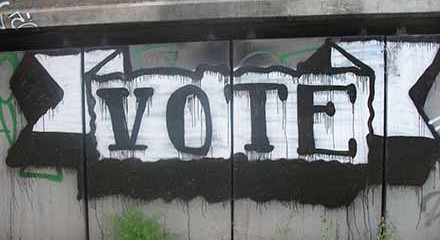The recent elections in Momentum allowed us to test our strength and present our arguments, writes Stan Keable
At a stroke Jon Lansman’s January 10 coup scuppered any remaining hope in Momentum’s fragile, emerging democracy. This after an email vote by six members of a defunct, out-of-time steering committee, without discussion or the opportunity of amendment. He imposed instead a nightmare of a constitution, which can only be rejected by members, against the will of the national coordinating group (NCG), if 30% of the entire membership vote to reject it (rule 9.5(ii)). As for the NCG itself, only 12 of its 28 seats are elected by the membership.
The coup was ‘legitimised’ by the results – announced the same day – of a ‘survey’ of members, in which 80.6% expressed a preference for decision-making by ‘one member, one vote’. Clicks were also 72.29% in favour of the well-crafted proposition that “all members should have a say in electing their representatives”. With a 40.35% turnout for the survey, that meant 32.5% and 29.2% respectively of the membership answered the ‘right way’ for what were loaded, but seemingly innocuous, questions. However, this was treated by Lansman as a green light to impose his hugely complex constitution without further consultation. National committee abolished, regional committees abolished, conference arrangement committee abolished, left groups and individuals blocked – job done.
What the coup has achieved is not the end of ‘factionalism’, but the entrenchment of Lansman’s dominant faction. Democracy has been snuffed out, the danger of the left exerting an influence by winning delegates averted and Momentum set on a path that will probably end in extinction. In place of what might have been a weapon in the hands of the Labour left, what now remains is little more than a Jeremy Corbyn fan club.
And, of course, Momentum’s database, money and the hiring and firing of staff remain safely in private hands. The main task of Momentum and the left should be democratising and transforming Labour into a party of the working class for socialism – but fear overcame hope. A democratic Momentum was bound to be seen as a threat by the Labour right. A bureaucratic Momentum is a threat to no-one.
Nevertheless Momentum’s pinched NCG elections enable us to measure the strength of the various political tendencies and organised factions. Participating did not legitimise the imposed constitution, as some ‘Don’t stand, don’t vote’ oppositionists claimed, any more than participating in parliamentary elections legitimises the United Kingdom’s constitutional monarchy – with its queen, lords, established church and standing army. For Marxists, participation in elections (with exceptions) is obligatory, for propaganda purposes. We should not miss the opportunity to present our political programme for the liberation of the working class from wage-slavery, and for the ending of all oppressions, through the achievement of world socialism.
National Coordinating Group
As I write, on February 22, Momentum’s website, intriguingly, still displays the following message: “The Momentum national coordinating group elections closed on Friday February 17 at 12 noon. Results will be announced soon.” Why the delay? Surely this cannot be an oversight on the part of Team Momentum. What spin, one wonders, is being cooked up behind the scenes?
Perhaps there is embarrassment, perhaps a difficulty in presenting a partial victory (despite all the advantages of controlling Momentum’s money, database and paid staff) for the ruling Jon Lansman faction, in a mere 33.75% turnout, as an overwhelming endorsement of his January 10 coup, constitution and digital pseudo-democracy.
The results were announced privately, however, in a Momentum HQ email to candidates on the evening the ballot closed. “Temporary Momentum organiser” Beth Foster-Ogg wrote to me that “unfortunately you were not successful in this election”. However, I received a respectable 458 votes on an explicitly Marxist platform. She gave a link to the full results.
Surely in need of a truth drug, Beth added that “A huge 34% of Momentum members voted in the election.” But 34% is not “huge”, and one should refrain from writing such guff, even if they pay you. The word “huge” was deleted from Beth’s next email, announcing the results to all members, sent less than an hour later. But also missing is any apology for the dishonest spin, and any acknowledgement or assessment of the “huge” 66% who did not vote – who were not inspired to get involved by the much vaunted inclusivity of the so-called “new politics” of online voting. After all, in terms of Lansman’s imposed Omov constitution, a 34% turnout, and the result itself, are both disappointing.
The rightwing (in Momentum terms) Lansman faction was undoubtedly better prepared and better organised than the anti-coup, anti-constitution left. On February 2, Lansman’s Left Futures blog announced its four-person slates for each of the three regional divisions. The opposition candidates, on the other hand, with varying degrees of criticism of the imposed constitution and the high-handed way it was imposed, divided their votes amongst 30 competing candidates, reflecting the political disunity of the left, as well as its disorganisation.
Nevertheless, despite their advantages, the Lansmanites were unable to sweep the board, losing three of the 12 seats to their critics. These defeats were limited because of the ‘first past the post’ system prescribed by the new, illegitimate constitution (illegitimate because it has never been put to a vote). Labour Party democracy is already in advance of Momentum’s in this respect, requiring transferable votes in its internal elections.
The ballot results circulated show that Momentum membership (“total eligible voters”) had reached 22,398 before the ballot opened, of whom only 7,559 voted. Unfortunately, the number of voters in each region is not given – perhaps that will appear on the website one day soon. The votes for each candidate is stated and, adding them up, we find the total votes cast is 29,000, of which only 12,429 – well under half – went to the Lansmanite slates. A total of 16,571 votes were cast for non-Lansmanite candidates, most of whom were variously critical of the coup and constitution. Under a transferable vote system, the outcome would have been much worse for Lansman. Truly, as socialist candidate Andrew Thompson rightly blogged, “the emperor has no clothes”.
In one of the three regions, the North and Scotland, oppositionists failed to present an identifiable slate. Out of 11 candidates, all four of the Lansmanites were elected, with a total of 4,260 votes, the other seven gaining 4,495. Two were backed by the Alliance for Workers’ Liberty: Camila Bassi (834) and Alan Runswick (705).
In the Midlands, Wales, East and West region there was a fudged oppositionist slate. Out of 18 candidates, the four Lansmanites gained only 3,519 votes, against a total of 6,334 votes for non-Lansmanite candidates. Three of the oppositionists tried to form a bloc with Andy Thompson (413 votes), but Andy asked members to vote for Rida Vaquas. Andy’s address had the best politics – “working class socialist principles”, “struggle for a socialist transformation of society”, “delegate democracy” and a sovereign national conference.
Perhaps that peculiar combination of factors partly explains why AWL-backed candidate Rida Vaquas topped the poll with 973 votes, knocking out Lansmanite candidate Sam Poulson (765). Rida’s forthright election address sharply criticised Lansman’s coup, promising to “fight for Momentum to be led by the grassroots membership and not by a clique at the top with no accountability whatsoever”. Momentum’s structures, she said, must be decided by members, “not by six people in a room in an email vote in less than an hour.”
No AWL candidate mentions that toxic organisation by name, nor its pro-Zionist, social-imperialist politics, nor its feeding into the fake anti-Semitism smear campaign in the Labour Party, nor its betrayal of Jackie Walker when she was under concerted Zionist attack. No surprise. The Momentum left is generally divided 50-50 on the issue of Zionism and the anti-Semitism smear campaign.
Four of the Lansman critics in the South East region presented a well organised slate (not including me) campaigning under the title, “Democracy and Socialism, for a Grassroots Momentum”, and two of them got elected: Yannis Gourtsoyannis (1,350) came second only to Lansman’s top candidate, Christine Shawcroft (1,382), while AWL-backed Sahaya James (1,018) knocked out Lansmanite David Braniff-Herbert (1,031) despite his slightly higher vote, because two of the four regional seats must be held by women. Christine Shawcroft’s Lansmanite slate, with its fake “Building the Grassroots” title, gained a total of 4,650 votes.
While the oppositionist slate gained 3,557, the total oppositionist vote was 5,742, beating the Lansmanite vote, as in all three regions. A more democratic transferable vote system would have produced an all-round defeat for Lansman – but he would still own Momentum, and would no doubt have changed the rules yet again.


